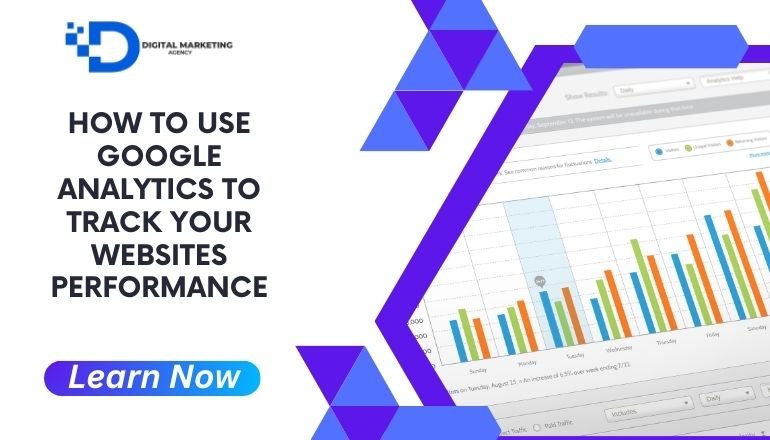In today’s digital landscape, understanding how your website performs is crucial to the success of your business. With digital marketing strategies such as SEO, PPC, social media advertising, and Google Ads, businesses can connect with their audience more effectively. However, to maximize the return on investment (ROI) of these campaigns, it’s essential to track and measure your website’s performance accurately.
Google Analytics is one of the most powerful tools for doing this. At Best Digital Marketing Agency, we specialize in helping businesses harness the full potential of digital strategies, ensuring that every click, conversion, and visitor is accounted for to drive meaningful growth.
1. What is Google Analytics?
Google Analytics is a free web analytics service that helps you track and analyze data from your website. It provides invaluable insights into how visitors interact with your site, where they come from, and how they behave once they arrive.
For businesses, Google Analytics is essential for understanding customer acquisition, identifying trends, and optimizing website performance. Whether you’re running PPC campaigns or building your SEO strategy, the data you gather from Google Analytics is key to making informed decisions that can boost both visibility and engagement.
2. Why Google Analytics Matters
Google Analytics allows you to track and measure essential metrics that impact your business success, such as:
- Traffic Sources: By understanding where your visitors come from, you can refine your marketing strategies, whether that’s through organic search, paid ads, or social media marketing.
- User Behavior: Monitoring metrics like bounce rate, page views, and time spent on a page gives you insights into how well your content resonates with visitors. This can guide you in content optimization and conversion rate optimization (CRO) efforts.
- Conversions and Goals: Setting up conversion tracking helps you measure how well your website is meeting your business objectives, such as lead generation or sales.
The insights from Google Analytics inform everything from SEO services to paid ad campaigns, helping businesses build better strategies for measurable success.
3. Key Components of Google Analytics
To effectively track your website’s performance, it’s important to understand the key components of Google Analytics:
- Audience Insights: This section helps you understand who your visitors are, including their demographics, interests, and geographic locations. These insights are critical for audience targeting in PPC campaigns and social media ads.
- Acquisition Reports: These reports show where your visitors are coming from, whether it’s organic search, direct traffic, paid search ads, or referral links. This data helps you optimize your SEO and Google Ads campaigns.
- Behavior Reports: These reports track how visitors interact with your website, including which pages they visit, how long they stay, and what actions they take. Understanding user behavior allows you to optimize for user engagement and improve the overall customer experience.
- Conversion Tracking: By setting up goals and eCommerce tracking, Google Analytics lets you measure key business outcomes, from form submissions to completed purchases. This feature is vital for ROI-driven campaigns and conversion optimization.
4. Best Practices for Using Google Analytics
To get the most out of Google Analytics, consider these best practices:
- Set Clear Goals: Define clear conversion goals in Google Analytics (such as form submissions or sales) to measure your website’s performance effectively.
- Use UTM Parameters for Campaign Tracking: Track the success of your specific campaigns (e.g., social media ads or email marketing) by using UTM parameters in your links.
- Segment Your Data: Use segmentation to break down data into more meaningful subsets, such as users from paid ads versus organic traffic. This allows for more targeted marketing and better performance insights.
- Integrate with Google Ads: By linking your Google Analytics and Google Ads accounts, you can track the effectiveness of your PPC campaigns in greater detail, optimizing ads and bidding strategies.
5. Common Mistakes to Avoid in Google Analytics
While Google Analytics is an incredibly powerful tool, many businesses make mistakes that undermine its effectiveness:
- Neglecting to Set Up Goals and Events: Failing to set up goals for tracking conversions means you miss out on critical data related to lead generation and ROI.
- Overlooking Data Filters: Without properly setting up filters, you may track internal traffic or irrelevant data, skewing your reports and insights.
- Not Using Segments Effectively: Not breaking down your audience into segments can lead to generalized insights that aren’t as useful. Use segments to track specific customer groups, which enhances conversion optimization and customer experience.
- Ignoring Mobile Traffic: With mobile traffic accounting for a large portion of visits, it’s crucial to track and optimize your website for mobile devices, making use of mobile-first design principles.
6. How Google Analytics Fits into a Comprehensive Digital Marketing Strategy
Google Analytics should be a key part of your holistic digital marketing strategy. Here’s how it integrates with other elements:
- SEO and Content Marketing: Google Analytics helps track which keywords and content drive the most traffic. You can use this data to refine your SEO strategies and ensure that your content is effectively reaching your audience.
- PPC Campaigns and Google Ads: By monitoring your Google Ads campaigns and their performance in Analytics, you can optimize your bidding strategies and target the most profitable audience segments.
- Social Media and Cross-Platform Campaigns: Google Analytics provides insights into how your social media efforts impact your website’s traffic and engagement. By combining social media marketing with data from Google Analytics, you can create more effective cross-platform campaigns.
By integrating these insights across your marketing efforts, you can build a stronger, more cohesive strategy that drives website traffic growth and higher ROI.
Conclusion: Key Takeaways
Google Analytics is a powerful tool for tracking and optimizing your website’s performance. By utilizing its key components audience insights, traffic sources, behavior reports, and conversion tracking you can refine your digital marketing strategies to achieve measurable business success. At Best Digital Marketing Agency, we help businesses leverage Google Analytics to drive growth and improve online visibility.
Ready to unlock the full potential of your website’s performance? Contact Best Digital Marketing Agency today to learn how we can help you make data-driven decisions for your business.













